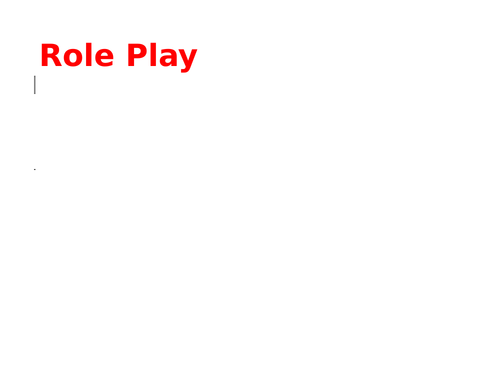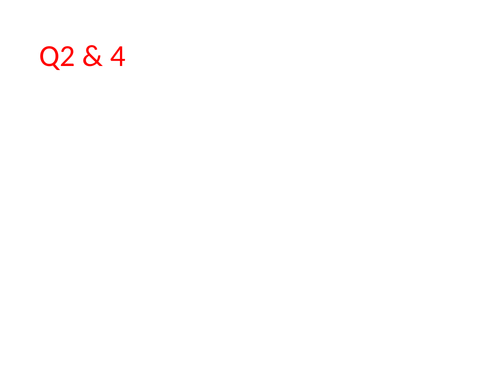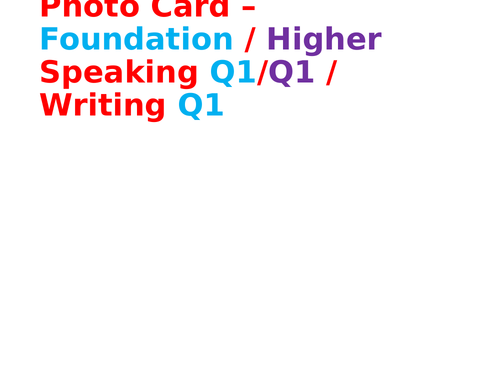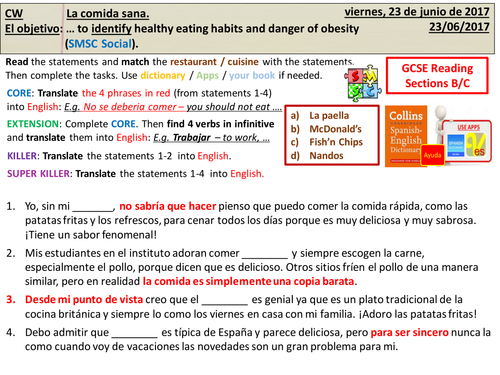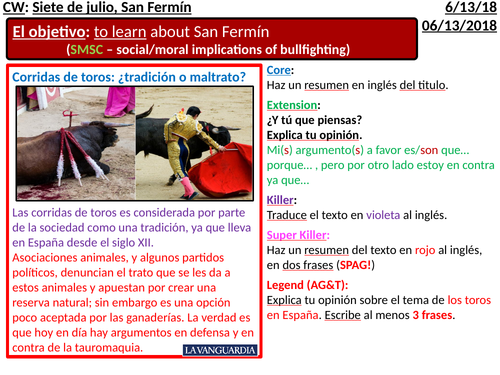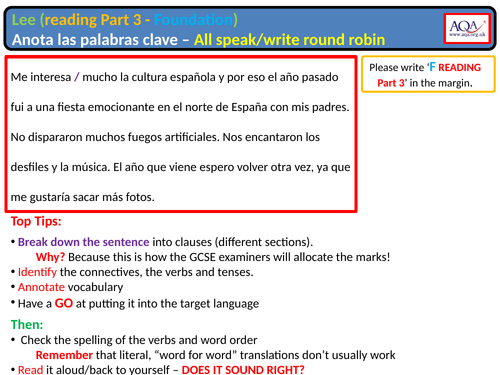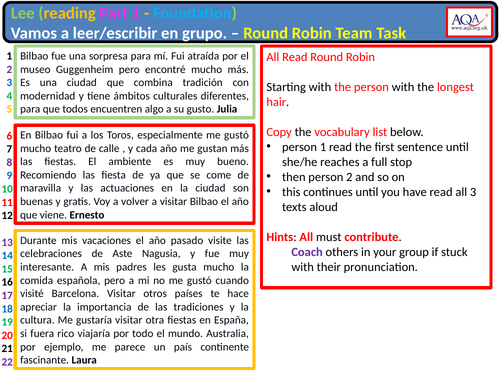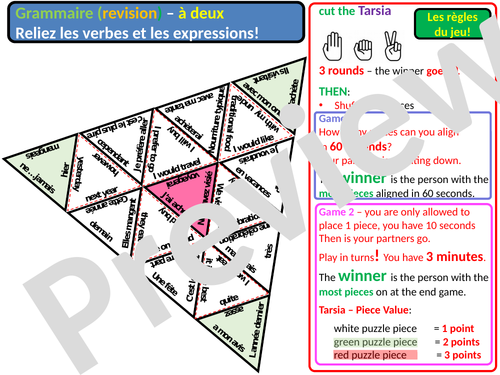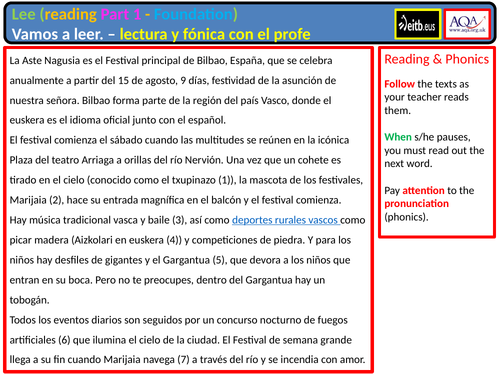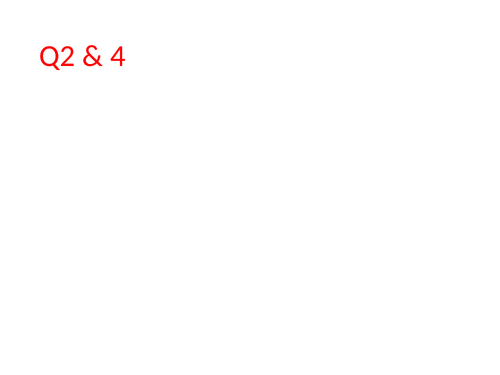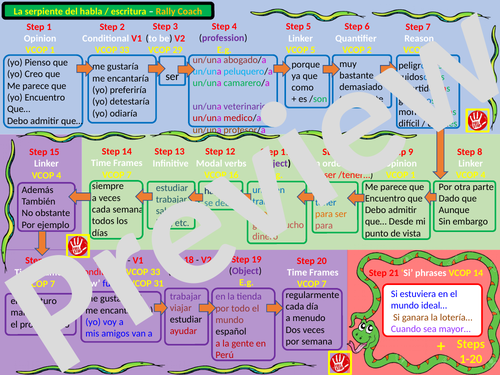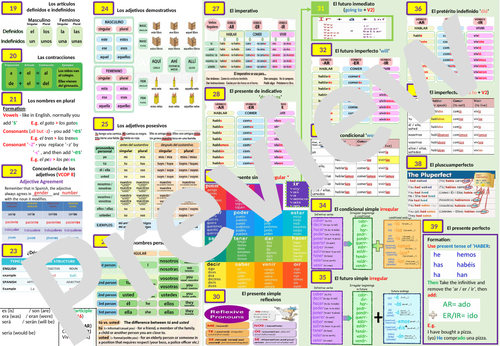
121Uploads
35k+Views
5k+Downloads
World languages

AQA GCSE Spanish - Role Play answer strategy
This is a template that I prepared for my higher year 8 Spanish students and early KS4 in relation to answering a Speaking Role Play task. Please note that this is a template and can be reused for different topics.
It starts with a Quizlet slide to revise (whilst being engaged!) some vocabulary prior to looking at the task. There are various Quizlet word lists available so you can just change the QR code and link if another list of words is needed. Then Students together with the teacher discuss the strategies and look at the task, success criteria and marking scheme and revise question words and how to form different types of questions in Spanish. They check their knowledge of the latter by way of completing a quick test and check their answers / discuss mistakes. They then jot their thoughts on a similar Role Play task in pairs (using grammar help - note: we use VCOP mat so if you have one you will need to change the numbers of the grammar points, if not you nees to delete few bits, the examples of structures are provided anyway) and complete in in writing individually . Then their ‘Time Pair Share’ the Role Play and self/peer -assess their work.
Please let me know if there are any problems / ideas!

AQA GCSE Spanish Games Conjugation Learning Grid and Cube// El Bingo (grammar/vocabulary/ revision)
These are few grammar games that I decided to share. I would use them for pretty much all age groups, both KS3 and KS4, GCSE both tiers. They can be easily amended to suit the grammar topics that you wish to reinforce / revise / introduce. The templates can also be easily reused for French.
See enclosed:
Verb conjugation Learning Grid (differentiated) - Students roll two dices to identify the tense and the pronoun they need to use. To make the task more complicated for more advanced students I ask them to create a sentence using the verb they got with particular amount of words to further challenge higher tier students. I would highly recommend it for the KS4 students.
El Bingo (good to promote Vocabulary / Listening / Phonics). Teacher gives studnets 15 words and asks them to write 5 of them down. Teacher then either says the translation of the words on the board (KS3) or defines them in Spanish / English (y9/10/11). If students recognise one of their words they cross it out, first one who crosses 5 wins!
Conjugation Cube. Students create a set of two dices that they will roll together. There are two versions of them to provide for two levels of differentiation. Students play in turns to conjugate the verbs! I included an origami version of the cube in case you wish to ask them to make the cube and to write the questions on their own (I took the scheme from the Google images so I do not claim any rights on that one.)
Let me know how it goes!

AQA GCSE Spanish - Writing (Foundation) answer strategy - Questions 2 and 4 / Higher Question 1
This is a template that I prepared for my higher year 8 Spanish students and early KS4 in relation to answering a Writing Foundation Questions 2 and 4 // Higher Tier Question 1. The topic of this example is celebrations / festivals.
Students begin by translating the short text into English and coaching each other if stuck at the same time assessing each other’s work. Then they revise some grammar by playing tarsia game (see template in the end of the presentation).
Consequently they get on with reading the question and what is required from them and discussing the what they could include in their answer (both content and grammar structures). Then they make a break and play a dice game (can be prepared prior to the lesson or during the same - see template in the end of the presentation) and a learning grid to revise verb tenses. They then get back to the task and work in pairs to plan their answers. Finally they complete the task individually, discuss the success criteria and the marking scheme with the teacher and peer / self assess their work.
Please let me know if there are any problems / ideas!

AQA GCSE (teaching from 2016) : Town and local area - Speaking - Photo card Model answer 1
This is the handout for my GCSE Spanish class to prepare for Speaking assessment. It includes brief success criteria and where to find it, what to include and a template for an answer. I have included both the PowerPoint slide and the handout.

AQA GCSE Spanish - Writing (Foundation) answer strategy - Question 3
This is a template that I prepared for my higher year 8 Spanish students and early KS4 in relation to answering a Writing Foundation Question 3. Please note that this is a template and can be reused for different topics. This one is related to the topic of free-time / holiday activities.
Students begin by discussing the strategies and looking at the success criteria and marking scheme together with the teacher. They also revise some basic grammar rules (can be amended each time you do the task). They also look at the model answers and discuss usual mistakes and how to avoid / amend them. Then they play few verb conjugation games to revise some useful verbs. I included the snakes and ladders game as well as the dice game (see templates in the end of the presentation). They review their answers to the dice game using grammar rules and correct their answers. Consequently they work in pairs to prepare a response to another (but similar!) Question 3. Finally they do it individually and self/peer -assess their work.
Please let me know if there are any problems / ideas!

AQA GCSE Spanish - Speaking / Writing (Foundation) Photo card answer strategy
This is a template that I prepared for my higher year 8 Spanish students and early KS4 in relation to answering a Speaking Photo card task which can also be used for explaining how to complete Writing Foundation Question 1. Please note that this is a template and can be reused for different topics.
It starts with a Quizlet slide to revise (whilst being engaged!) some vocabulary prior to looking at the task. There are various Quizlet word lists available so you can just change the QR code and link if another list of words is needed. Then Students together with the teacher discuss the strategies and look at the task, success criteria and marking scheme and jot their thoughts in relation to a given Photo Card. They then play a catchphrase game in teams to reveal the phrase hidden behind (NOTE: when replacing the top centre image copy the animation from on of the coloured boxes around (Animation tab, animation painter), so that when you click on the image it does disappear similar to the coloured boxes around.)
Then they work in pairs to prepare a response to another (but similar!) photo card. Finally they do it individually and self/peer -assess their work.
Please let me know if there are any problems / ideas!

Healthy Schools week PSHE - La comida sana - KS4 Spanish AQA new spec
This is the lesson I have prepared for the healthy schools week for my year 9 and 10 Spanish GCSE classes. It consists of starter, tongue twister to practice phonics, a mini-test on adjectival agreement and articles (I love those surprised faces when they see the word 'TEST'), quizlet task to learn / revise vocabulary on food, quizlet live to consolidate the same, AQA Listening Section A task with explanation on tips and strategies (my usual walk-through, I usually read it out myself) with self-assessment. It is followed by the Reading Section A task on obesity case in Mexico (from EL PAIS online journal) with the same walk-through and Oracy task (slide 20). I would usually read the text and pause for the students to say the word I was about to read so they actually practice phonics and follow the text. For the end I asked them to prepare a poster for the year 6 students that are coming to school for few days to look around. There are also some mini-plenaries here and there. The origin of the Listening task is VIVA AQA Higher GCSE book. Buena suerte!

GCSE Spanish- 6 Starters -Cultural/SMSC (differentiated -5 levels)-Speaking, Reading, Writing skills
This a set of Starters with answers that could be used either for the lessons from the topic of festivals and celebrations or as a stand out SMSC - Cultural starter. I included answers so that children can check their answers. These are mostly for higher y8 or for KS4 lessons, differentiated (CORE, EXTENSION, KILLER, SUPERKILLER, LEGEND). All of the instructions are in Spanish.
They can also serve as a template to create your own tasks - just change the text and (slightly) the questions.
First Starter is on the topic of San Fermin and includes an authentic text from the ‘La Vanguardia’, an on line newspaper. The examination focus of this starter is Reading. Second Starter features similar tasks but a different text, also authentic.
The third one is on the topic of La Tomatina and is essentially a Role-play task with success criteria. It therefore focuses on Speaking.
The fourth one is a Photo card Starter on the topic of Aste Nagusia (or festivals in general) with help and instructions and therefore can be used as a Speaking / Writing activity. Fourth one follows the same idea but is designed for the topic of holidays.
The fifth is a grammar starter for any holidays topic and its focus is the Past Simple (preterite) and the Future SImple (‘will’). We use Viva books so I included help boxes as a reminder for those who do not clearly remember the endings.
The sixth starter focuses on Reading (parts B and C). Students translate and analyse the adjectives in the Wordle.
Let me know what you think!

AQA GCSE Spanish - Reading Section C - SP-ENG translation (Foundation) answer strategy
This is a template of a set of activities that I prepared for my higher year 8 Spanish students and early KS4 in relation to answering a Reading Section C Foundation task (SP-ENG translation).
Please note that this is a template and can be reused for different topics. This one is related to the topic of festivals and celebrations.
First of all students discuss the task and top tips with each other (All speak / write round robin) and then move on with discussing separate phrases in terms of grammar. Then they use the help / hints to translate the text individually. Then they check the answers, discuss them with each other and self-peer assess their work.
Please let me know if there are any problems / ideas!

AQA GCSE Spanish - Reading Section B (Foundation) answer strategy / Aste Nagusia
This is a template of a set of activities that I prepared for my higher year 8 Spanish students and early KS4 in relation to answering a Reading Section B Foundation task (questions and answers in Spanish) with elements of Part A to explain the main concepts.
Please note that this is a template and can be reused for different topics. This one is related to the topic of festivals and celebrations. It is based on the texts about Aste Nagusia.
The students read the texts aloud (Oracy!) in turns as a class and then play an ‘air writing’ game which basically means they are trying to locate the words that the teacher asks them to find. Next they do a similar task, trying to answer in Spanish in which line is the word the teacher asked them to locate. Next they annotate keywords in groups trying to translate as many unknown words as possible (in a group - coaching each other). They then play a quick tenses game to revise how to identify present, past, immediate future and conditional verbs and how to correctly translate them into English.
Consequently they revise the strategies for approaching Reading Part A/B tasks and play a quick translation game. I then thought it would be useful if they quickly revise the Spanish question words by playing an online game (from the Language Gym website - free and useful!) and complete the Reading Part B task (differentiated).
Please let me know if there are any problems / ideas!

AQA GCSE Spanish Games Roll-a-Word//Speaking Cube// OXO (speaking / writing /translation / revision)
These are few grammar games that I decided to share. I would use them for pretty much all age groups, both KS3 and KS4, GCSE both tiers. They can be easily amended to suit the grammar topics that you wish to reinforce / revise / introduce. The templates can also be easily reused for French.
See enclosed:
Roll-A-Word - Students roll a dice to complete different tasks related to the new and / or familiar words (both learning and revising). They count the value of the completed dices to make the task more competitive.
Speaking Cube - 6 sides of the cube are completed with the topic questions for the half-term. Students roll a cube (you can either ask them to glue them together or you can make them yourself). I figured 6 cubes per year for each year group is an easy enough task to continue repeating the questions of all half-terms for the whole school year. I included an origami version of the cube in case you wish to ask them to make the cube and to write the questions on their own (I took the scheme from the Google images so I do not claim any rights on that one.)
OXO - One of my favourite tasks to develop spontaneous speaking. Students play OXO in turns following the rules. The ? (= random/phantom question or topic) can be used to increase the level of complexity of the game. Furthermore, a certain set of rules can be imposed, e.g. ‘ensure you use a preterite tense of your choosing as main verb of the ‘!’ box. It can be played using ‘home and away’ tables, i.e. grouping students by ability bands, so that all low/medium/high band students play together, which might, for example, allow the teacher to put in place bespoke interventions to support those in need of guidance. I have included three templates of OXO that can be used as a speaking, writing and translation tasks, differentiated according to the level of knowledge and KS group. See noted for additional ideas and hints.
Let me know how it goes!

KS3/KS4 French-Speaking Cube/Tarsia/Conjugation Learning Grid Games (speaking / writing / revision)
These are two grammar games that I decided to share. I would use them for pretty much all age groups, both KS3 and KS4, GCSE both tiers. They can be easily amended to suit the grammar topics that you wish to reinforce / revise / introduce.
See enclosed:
Tarsia slide and template - an activity to use to revise topic / key vocabulary. Students can either create their own or just cut the one you prepare for them. They need to then match the words / expressions in English with their French equivalents.
Speaking Cube - 6 sides of the cube are completed with the topic questions for the half-term. Students roll a cube (you can either ask them to glue them together or you can make them yourself). I figured 6 cubes per year for each year group is an easy enough task to continue repeating the questions of all half-terms for the whole school year. I included an origami version of the cube in case you wish to ask them to make the cube and to write the questions on their own (I took the scheme from the Google images so I do not claim any rights on that one.)
Verb conjugation Learning Grid (differentiated) - Students roll two dices to identify the tense and the pronoun they need to use. To make the task more complicated for more advanced students I ask them to create a sentence using the verb they got with particular amount of words to further challenge higher tier students. I would highly recommend it for the KS4 students.
Let me know how it goes!

AQA GCSE Spanish - Writing (Foundation) answer strategy - Question 1
This is a template that I prepared for my higher year 8 Spanish students and early KS4 in relation to answering a Writing Foundation Question 1 (photo card).
Please note that this is a template and can be reused for different topics. This one is related to the topic of carnivals and celebrations.
It starts with a Quizlet slide to revise (whilst being engaged!) some vocabulary prior to looking at the task. There are various Quizlet word lists available so you can just change the QR code and link if another list of words is needed. Then Students together with the teacher discuss the strategies and look at the success criteria and marking scheme. Then they play few verb conjugation games to revise some useful verbs that they can use to describe the photo card later on in the lesson. Consequently they jot their thoughts on a different photo card (working in pairs / groups) and play a catchphrase game to get more ideas on the topic. Then they work in pairs to prepare a response to another (but similar!) photo card. Finally they do it individually and self/peer -assess their work.
Please let me know if there are any problems / ideas!

AQA GCSE Spanish - Reading Section A (Foundation) answer strategy / Aste Nagusia
This is a template of a set of activities that I prepared for my higher year 8 Spanish students and early KS4 in relation to answering a Reading Section A Foundation task (answers in English).
Please note that this is a template and can be reused for different topics. This one is related to the topic of festivals and celebrations. It is based on a text about Aste Nagusia from the official governmental website so the text is just mildly redacted to suit the level of the readers. See the link embedded in the image in the first slide.
The students read the text aloud (Oracy!) in turns as a class and then again in groups. Then they use their knowledge, dictionary / Apps to locate the meaning of unknown keywords and look at the pictures for these keywords. Then they play team challenge game to find the meaning of the Spanish verbs that appear in the text and check their answers. Next is the reading of the unrelated literary text in English in groups to exemplify that the meaning of the words in read (with jumbled letters) does not actually stop them from understanding the text.
Consequently they revise the strategies for approaching Part A tasks, play a quick translation game and complete the tasks (differentiated).
Please let me know if there are any problems / ideas!

AQA GCSE French - Writing (Foundation) answer strategy - Questions 2 and 4 / Higher Question 1
This is a template that I prepared for my higher year 8 students and early KS4 in relation to answering a Writing Foundation Questions 2 and 4 // Higher Tier Question 1. The topic of this example is celebrations / festivals.
Students begin by translating the short text into English and coaching each other if stuck at the same time assessing each other’s work. Then they revise some grammar by playing tarsia game (see template in the end of the presentation).
Consequently they get on with reading the question and what is required from them and discussing the what they could include in their answer (both content and grammar structures). Then they make a break and play a dice game (can be prepared prior to the lesson or during the same - see template in the end of the presentation) and a learning grid to revise verb tenses. They then get back to the task and work in pairs to plan their answers. Finally they complete the task individually, discuss the success criteria and the marking scheme with the teacher and peer / self assess their work.
Please let me know if there are any problems / ideas!

KS3/GCSE Spanish-MAT-La serpiente del habla (Jobs)-independent Speaking/Writing (differentiated)
This is a differentiated Speaking / Writing exercise that I tend to use every half-term to encourage spontaneous speaking / writing. It is a variation of a trap door exercise that can be adapted for every topic as only topic specific vocabulary changes (not connectives / frequencies / opinions). This particular mat is to speak / write on the topic of (Future) Jobs / Employment plans.
Enjoy!
Bundle

Mi ciudad - Activities in town, photo card worksheet and project AQA GCSE
This is a brief bundle for the young GCSE Spanish class or for the revision of the older students. I included 2 versions of my observation lesson (practice of Section C reading exam task), a photo card help worksheet (can also be used for the topic writing practice) and a research project about a favourite town with the model answer that practically summarises the topic vocabulary and can also be used for the revision tasks (can be amended if needed).

AQA GCSE (KS4) / KS3 VCOP - Spanish Literacy Mat
This a VCOP / Literacy Mat that I have prepared for my KS3 and KS4 classes. I prepared it to reflect AQA examination criteria however I believe Spanish language does not change in-between different examination organisations so can be used for different ability students studying for different types of exams. It covers 39 different grammar structures including main verb tenses and popular structures that I recommend my students use for their writing, speaking and reading practice (and learn to identify when listening). It is partially differentiated (see groups highlighted in 3 colours - blue for Core, green for Extension, red for Killer). Parts of the mat with green background represent the most popular verb tenses and verbal structures.
I have included the most useful (in my point of view) opinions, adverbs, exclamations, connectives, linking expressions, quantifiers, time expressions, question words, V1 + V2 structures, subjunctive and conditional phrases, gerunds and few more expressions that worth few shiny points if used during the exam. I have considered it would be useful to include the endings and explanation on how to follow adjectival agreement rules, use correct articles and pronouns. In relation to verb tenses, providing there is not as much space as it seems to be, I have included the verb tables for present simple (regular and irregular + self-reflexive), imperative, immediate (near) future, ‘will’ future, regular and irregular conditional, past simple, imperfect and past perfect (for those who are truly passionate about grammar.
If you wish to add something just amend / move few boxes and you will be done. If printing, I would recommend to do so on A3 to ensure that all of the instructions are clearly visible.
Note: to remove ‘Preview’ just select it and delete - it is just one text box. Let me know how it goes and what you think!
Bundle

Spanish Grammar / Vocabulary Games KS3/KS4/GCSE - Foundation and Higher
This is a collection of grammar games that I decided to share. I would use them for pretty much all age groups, both KS3 and KS4, GCSE both tiers. They can be easily amended to suit the grammar topics that you wish to reinforce / revise / introduce. The templates can also be easily reused for French.
See enclosed:
Snakes and ladders slide (you can amend the squares and it is short enough to serve as a 5-10 minutes activity;
Tarsia slide and template - an activity to use to revise topic / key vocabulary. Students can either create their own or just cut the one you prepare for them. They need to then match the words / expressions in English with their Spanish equivalents.
The dice game to revise verbs conjugations (differentiated). I included a slide with rules of the game, a template to create your own and an origami instructions to make it more hands on.
Photo card scrabble (related to AQA GCSE speaking / writing tasks). I originally thought of this as a game prior to completing an exam task for KS4 students. The pack includes a slide and a scrabble board if you wish to organise an extended activity. Students need to come up with words related to the image, the words should contain 3 or more letters and they should be in Spanish!
Dice conjugation (differentiated) - I would mostly suggest it for KS4 students as it is easier to differentiate. Students have a board with verbs and they need to roll dices to ascertain the personal pronoun that they apply to the infinitive on the board. My students totally loved it!
One dice, one pen (un dado, un boli) - (differentiated, AQA Reading Section C / Writing Part 3 Higher / Foundation) - Students roll dice in turns to translate the sentence correctly! If the partner throws 3 he takes over a pen. The winner is the one who collected the most points. I used it with KS4 to facilitate the exam translation tasks. I also included a set of slides that I used to emphasize certain grammar points.
Let me know how it goes!
Bundle

AQA GCSE Spanish - Writing (Foundation) answer strategy
These are the templates that I prepared for my higher year 8 Spanish students and early KS4 in relation to answering Writing Foundation Questions 1-4. They include different games and tasks to revise verbs conjugations and vocabulary to answer the questions.
I also included the templates for some games and activities. These templates are totally amendable and adaptable to use with different topics and so far worked for my students.
Please let me know how it goes!

